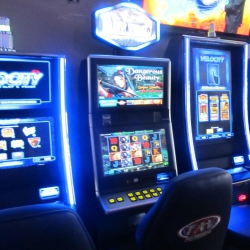Several Indiana groups are lobbying to bring video gaming terminals to the state. VGTs are similar to the electronic slot machines found in casinos these days. There are some differences.
For instance, Indiana video gaming terminals would restrict bets to $2 at maximum. The max payout on such games would be $599. VGTs would be limited to American Legion and VFW posts, truck stops, and bowling alleys. The idea is to give local mom-and-pop businesses and veterans groups a lift.
Bowling, Beverage, and Amusement Groups
The groups lobbying for the VGTs are the Indiana Bowling Centers Association (IBCA), the Indiana Licensed Beverage Association (ILBA), and the Indiana Amusement and Music Operators Association (IAMOA). The groups are trying to mirror the success of Illinois VGTs operators. Illinois legalized such gaming machines in 2012.
Bill Smythe: Lobbyist
Bill Smythe, a lobbyist for the IAMOA, said his group wants to help local vendors. Smythe said, “Basically what we’re trying to do is create revenues for local businesses and local communities through VGT’s, which they have done in Illinois very successfully. We’re trying to mirror that effort.”
Smythe cited the Illinois statistics to defend his position. He said, “They’re up to almost 22,000 machines now generating almost a billion dollars in revenues, which nets the state about $300 million.”
Illinois VGT Culture
Not everyone is a fan of the measure. Even in Illinois, the VGT phenomenon has caused local and statewide controversies. Some cities ban them, only to see their citizens drive to the next town over to play. Revenues flow to the next municipality, but it is the price to pay for taking a moral stand.
Some have a more practical reason to avoid such gaming: they don’t think the VGTs pay out very often. Fox59 in Indianapolis spoke to Indiana truck drivers who travel through Illinois for their jobs, to see what their experience was.
Fox59 Talks to Truck Drivers
One trucker, Charlie Goodman, said he avoids the gaming machines. Goodman said, “The odds of winning are so ridiculously bad that it’s not even worth it, it’s a waste of money.”
Steve Raven, another local truck driver, had a different point of view. While they might not do people much good, they’re also relatively harmless, said Raven. He said the limitations of the VGTs make them much less dangerous than slot machines, though.
Mr. Raven said, “I don’t really think it’s going to be a really big issue unless you have a really bad gambling problem.”
Revenues without Raising Taxes
Bill Smythe made the argument which good lobbyists around the United States use to justify such gaming: these are a way to generate revenues without a direct tax on taxpayers. Residents can choose to play or not, so whatever loss of money is voluntary. The taxation comes against the business owners, but they are happy to pay taxes, because the machines increase their revenue.
Smythe said proponents of the bill have made accommodations to meet the tax needs of states and cities. Instead of leveling a property tax or a sales tax, the revenues are drawn from gaming receipts. Thus, much-needed infrastructure costs are paid by game enthusiasts, not residents or grocery shoppers.
Mr. Smythe said, “We adjusted our bill last session to accommodate for 80 percent of the taxation to be applied to road infrastructure and of that, half goes to the state and half goes to local communities. It’s really as simple as that, there’s going to be a tax or they can use the revenues generated from this.”
No Sponsorship in the Legislature
The VGT initiative is so far a grass-roots effort. While the groups are pushing the legislation, no lawmakers have shown an interest yet in sponsoring such a bill. To be included in the legislative calendar, at least one legislator in each of Indiana’s state houses must sponsor the bill.
They are talking, though. A series of town hall meetings have been arranged to see what the people of Indiana think of the measure. The next meeting takes place this Tuesday in Evansville, Indiana.

